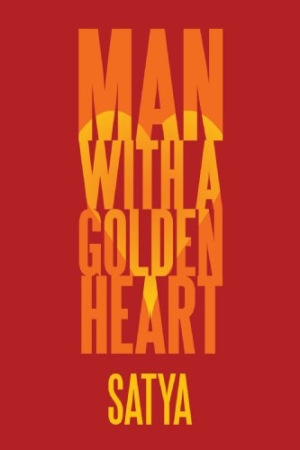Man with a Golden Heart
Satya Sri is a doctor, not a poet. He is also a man in great pain, and one who has turned to poetry to give voice to that pain. While not a great work of art, Man With A Golden Heart is Sri’s honest, sincere, and brave attempt to find some balm for his open wounds.
The collection contains no chapters, no organization by theme, and no titles for the individual poems. Most of what Sri presents is free verse, hastily written rather than labored over. Many of the pieces come across as random thoughts meant to give vent to the author’s frustration or anger at being incapable of helping a patient, or himself, through difficult times. Each work represents one step on Sri’s journey, and some days that journey is harder than others.
Aside from his physical ailments—one poem demands that cancer “get the hell out of me”—the author admits to being tormented by doubt and desire and plagued by tension and troubles, some so desperate as to be life-threatening. This suffering and confusion in his soul leads Sri to question the benevolence and, at times, the very existence of God.
Some of the verses are offered up as prayers, including one that contains the particularly moving lines, “I am the unluckiest, yet I am the luckiest / I am the most cursed of all, yet I am the most blessed.” These words are likely to resonate with those who have felt a similar dichotomy in their universe.
There are other prayers as well as angry rants, questioning chants, frustrated shouts, and painful cries for justice, mercy, and relief. There are also some one-line poems not unlike those found in fortune cookies: “Richness of a person must be in heart and mind and not in money,” and “It is better to be a materialistic loser and be a spiritual gainer.” While some verses would seem trite in a random book of poetry, here they offer a look inside the heart and mind of a man in pain.
Sri’s sometimes uneven work goes beyond talk of his own pain, however, to address larger issues. He presents a twenty-one-line piece on poverty and poor children and offers a one-line supposition that “HIV is sent by God to human beings as a punishment to realise their limitations.” These pieces are not as powerful as the author’s more personal offerings, as they seem more like opinions rather than heartfelt emotions.
The author writes a great deal about cancer, at times addressing the disease itself as if it could listen. Some of his writings understandably express his anger at cancer, while others—the final offering in the book in particular—pay homage to it. He thanks cancer for how it “has subdued [him]” by taking away his arrogance and ego and showing him his limitations.
At the very end, the collection presents the reader with Sri’s progress through a time of troubles. A man who may once have believed he had, or should have had, godlike powers to save and cure people is only a man, and one who has turned to poetry to understand and deal with his own failings. People suffering from similar trials, especially those who feel powerless in the face of cancer and other maladies, may take some small comfort in knowing that there is at least one doctor out there who not only understands but also feels their pain.
Reviewed by
Mark McLaughlin
Disclosure: This article is not an endorsement, but a review. The publisher of this book provided free copies of the book and paid a small fee to have their book reviewed by a professional reviewer. Foreword Reviews and Clarion Reviews make no guarantee that the publisher will receive a positive review. Foreword Magazine, Inc. is disclosing this in accordance with the Federal Trade Commission’s 16 CFR, Part 255.

